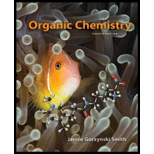
Concept explainers
(a)
Interpretation: The product formed when the given compound in Problem 27.6 undergoes photochemical electrocyclic ring opening or ring closure is to be predicted. The given process is to be labeled as conrotatory or disrotatory. The stereochemistry around tetrahedral stereogenic centers and double bonds is to be indicated.
Concept introduction: Electrocyclic reactions involve the conversion of
Curved arrows aid in determining the movement and flow of electrons in the reaction. The electrons that take part in the
Answer to Problem 27.8P
The product formed in the given photochemical electrocyclic ring closure reaction is
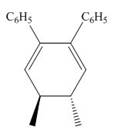
Explanation of Solution
The thermal electrocyclic ring closure reaction is shown below.
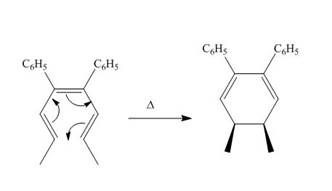
Figure 1
Electrocyclic reactions involve the conversion of
Under photochemical condition, conrotatory process takes place in the given reaction. The orientation of substituents and stereochemistry around tetrahedral stereogenic centers and double bonds in the given reaction are shown below.
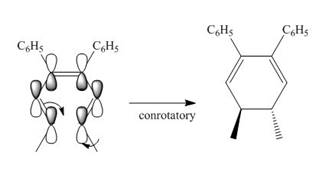
Figure 2
The conrotatory process involves the rotation of two orbitals in the same direction. The reaction in above figure implies that orbitals move in the same direction in the reactant molecule and the formation of trans product occurs. One methyl group is present above the plane and one methyl group is present below the plane in the product. Therefore, the product formed in the given photochemical electrocyclic ring closure reaction is
The product formed in the given photochemical electrocyclic ring closure reaction is
(b)
Interpretation: The product formed when the given compound in Problem 27.6 undergoes photochemical electrocyclic ring opening or ring closure is to be predicted. The given process is to be labeled as conrotatory or disrotatory. The stereochemistry around tetrahedral stereogenic centers and double bonds is to be indicated.
Concept introduction: Electrocyclic reactions involve the conversion of
Curved arrows aid in determining the movement and flow of electrons in the reaction. The electrons that take part in the chemical reactions are shown by the curved arrows.
Answer to Problem 27.8P
The product formed in the given photochemical electrocyclic ring opening reaction is
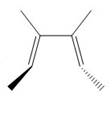
Explanation of Solution
The thermal electrocyclic ring opening reaction is shown below.
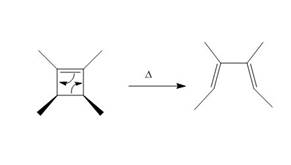
Figure 3
Electrocyclic reactions involve the conversion of
Under photochemical condition, disrotatory process takes place in the given reaction. The movement of substituents and stereochemistry around tetrahedral stereogenic centers and double bonds in the given reaction are shown below.
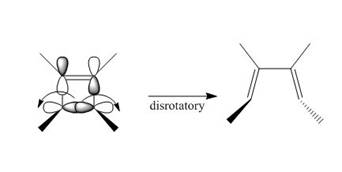
Figure 4
The disrotatory process involves the rotation of two orbitals in the opposite direction. The reaction in above figure implies that orbitals move in the opposite direction in the reactant molecule and the formation of trans product occurs. One methyl group is present above the plane and one methyl group is present below the plane in the product shows the stereochemistry. Therefore, the product formed in the given photochemical electrocyclic ring opening reaction is
The product formed in the given photochemical electrocyclic ring opening reaction is
Want to see more full solutions like this?
Chapter 27 Solutions
Organic Chemistry
- For each reaction below, decide if the first stable organic product that forms in solution will create a new CC bond, and check the appropriate box. Next, for each reaction to which you answered "Yes" to in the table, draw this product in the drawing area below. Note for advanced students: for this problem, don't worry if you think this product will continue to react under the current conditions - just focus on the first stable product you expect to form in solution. དྲ。 ✗MgBr ? O CI Will the first product that forms in this reaction create a new C-C bond? Yes No • ? Will the first product that forms in this reaction create a new CC bond? Yes No × : ☐ Xarrow_forwardPredict the major products of this organic reaction: OH NaBH4 H ? CH3OH Note: be sure you use dash and wedge bonds when necessary, for example to distinguish between major products with different stereochemistry. Click and drag to start drawing a structure. ☐ : Sarrow_forwardPredict the major products of this organic reaction: 1. LIAIHA 2. H₂O ? Note: be sure you use dash and wedge bonds when necessary, for example to distinguish between major products with different stereochemistry. Click and drag to start drawing a structure. X : ☐arrow_forward
- For each reaction below, decide if the first stable organic product that forms in solution will create a new C - C bond, and check the appropriate box. Next, for each reaction to which you answered "Yes" to in the table, draw this product in the drawing area below. Note for advanced students: for this problem, don't worry if you think this product will continue to react under the current conditions - just focus on the first stable product you expect to form in solution. NH2 tu ? ? OH Will the first product that forms in this reaction create a new CC bond? Yes No Will the first product that forms in this reaction create a new CC bond? Yes No C $ ©arrow_forwardAs the lead product manager at OrganometALEKS Industries, you are trying to decide if the following reaction will make a molecule with a new C-C bond as its major product: 1. MgCl ? 2. H₂O* If this reaction will work, draw the major organic product or products you would expect in the drawing area below. If there's more than one major product, you can draw them in any arrangement you like. Be sure you use wedge and dash bonds if necessary, for example to distinguish between major products with different stereochemistry. If the major products of this reaction won't have a new CC bond, just check the box under the drawing area and leave it blank. Click and drag to start drawing a structure. This reaction will not make a product with a new CC bond. G marrow_forwardIncluding activity coefficients, find [Hg22+] in saturated Hg2Br2 in 0.00100 M NH4 Ksp Hg2Br2 = 5.6×10-23.arrow_forward
- give example for the following(by equation) a. Converting a water insoluble compound to a soluble one. b. Diazotization reaction form diazonium salt c. coupling reaction of a diazonium salt d. indacator properties of MO e. Diazotization ( diazonium salt of bromobenzene)arrow_forward2-Propanone and ethyllithium are mixed and subsequently acid hydrolyzed. Draw and name the structures of the products.arrow_forward(Methanesulfinyl)methane is reacted with NaH, and then with acetophenone. Draw and name the structures of the products.arrow_forward
- 3-Oxo-butanenitrile and (E)-2-butenal are mixed with sodium ethoxide in ethanol. Draw and name the structures of the products.arrow_forwardWhat is the reason of the following(use equations if possible) a.) In MO preperation through diazotization: Addition of sodium nitrite in acidfied solution in order to form diazonium salt b.) in MO experiment: addition of sodium hydroxide solution in the last step to isolate the product MO. What is the color of MO at low pH c.) In MO experiment: addition of sodium hydroxide solution in the last step to isolate the product MO. What is the color of MO at pH 4.5 d.) Avoiding not cooling down the reaction mixture when preparing the diazonium salt e.) Cbvcarrow_forwardA 0.552-g sample of an unknown acid was dissolved in water to a total volume of 20.0 mL. This sample was titrated with 0.1103 M KOH. The equivalence point occurred at 29.42 mL base added. The pH of the solution at 10.0 mL base added was 3.72. Determine the molar mass of the acid. Determine the Ka of the acid.arrow_forward
